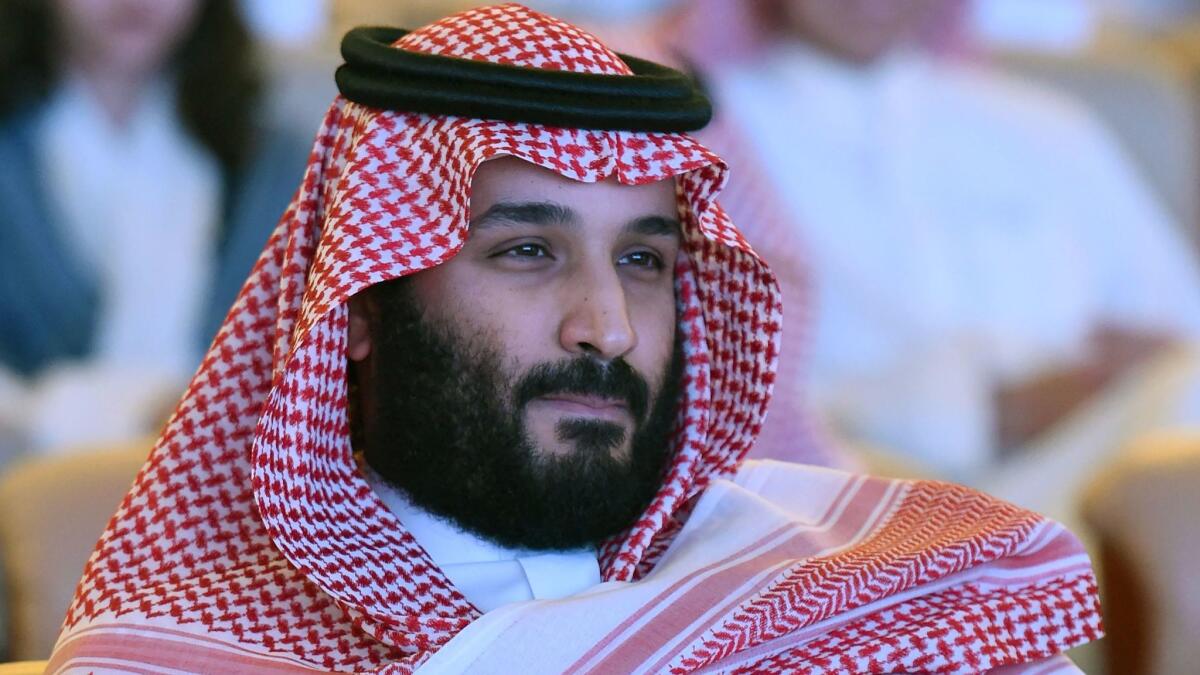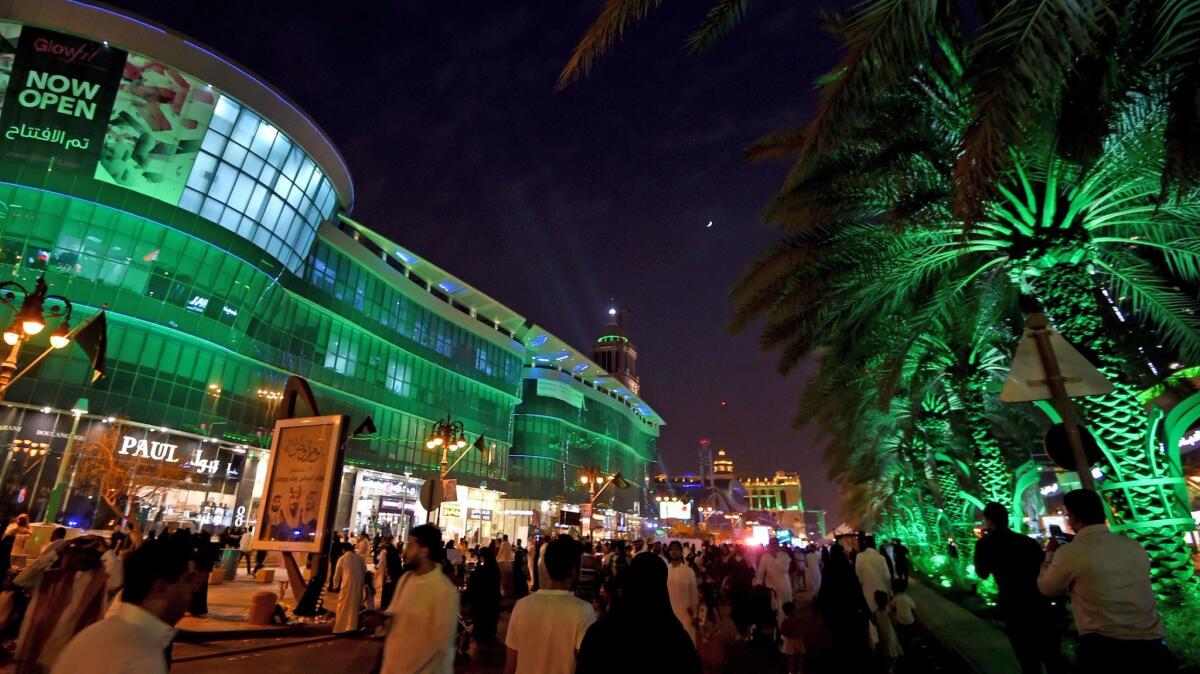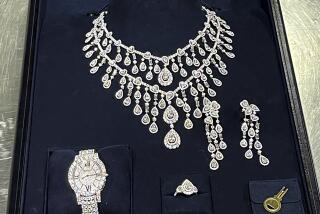In gilded Saudi royal circles, corruption has long been a way of life
Reporting from BEIRUT — Behind the walls of one of his many opulent palaces, the king was troubled. He knew all too well that the self-dealing ways and gold-plated lifestyle of the House of Saud — whose princes and princelings numbered in the thousands — had spiraled out of control. Things had to change.
That was a decade ago.
Leaked American diplomatic cables from the time described the attempts of then-King Abdullah bin Abdulaziz to rein in the money-skimming excesses of his fabulously wealthy fellow royals. The Saudi Arabian monarch, already an octogenarian, reportedly told his brothers that he didn’t want to face Judgment Day with “the burden of corruption” on his shoulders, the diplomatic memos said. He died in 2015.
Now the kingdom’s brash young crown prince, 32-year-old Mohammed bin Salman, has proclaimed a new war on corruption. Acting at his behest, Saudi authorities have accused hundreds of people, including a dizzying roll call of prominent princes, of crimes that include graft, bribery and money laundering.

The arid peninsula’s business lore brims with tales of ambitious infrastructure projects that shimmered like mirages, their cost vastly inflated by blatant bribery demands from royal and VIP patrons, their completion delayed or doomed altogether by brazen high-level malfeasance.
A gleaming subway in the capital, Riyadh, a promised-but-unbuilt sewer system in the port city of Jidda, even the Grand Mosque complex in the holy city of Mecca — all have come under scrutiny over kickbacks and misappropriated funds. In past years, other Saudi deals such as lucrative arms contracts have ensnared foreign partners.
The Jidda case had particularly tragic consequences. A powerful Saudi businessman had accepted a multimillion-dollar payment to build a new sewage and drainage system, but merely pretended to have completed it — a ruse that was widely known among commoners as well as the ruling elite. Later, in 2009, flooding sent torrents of water coursing through the city, killing more than 100 people. The lack of a viable drainage system was a key underlying cause.
To the point of cliche, trappings of the luxe life have become the Saudi royal family’s calling cards the world over: yachts and private planes, an endless array of designer goods, venerable enterprises purchased like baubles, sumptuous apartments in London and Paris, the commandeering of entire wings of the planet’s most exclusive hotels.
“Clearly, they understand they’ve had a corruption problem for decades, and know they have to do something,” said Robert Jordan, a former U.S. ambassador to Saudi Arabia, citing the “shakedown culture” that surrounded the royal family and other elites.
Many veteran Saudi watchers, and more than a few wary investors, are questioning whether the prince’s ostensible cleanup drive is primarily a bid to consolidate power and sideline potential rivals — following a template used by authoritarian leaders such as Chinese President Xi Jinping or Russian President Vladimir Putin, both of whom have jailed potential adversaries on corruption charges.
“There are some concerns that what this is really going to do is centralize oversight of public spending, and the same practices will continue, but among a smaller group of people,” said Allison Wood, an analyst for Control Risks, a London-based global risk and strategic consulting firm.
The “real test” of a serious anti-corruption drive, she said, would be “not just to pursue these people for corruption, but to maintain and set a new standard for transparency.”
Even some of the prince’s many critics, though, acknowledge that he is correctly reading the zeitgeist in the kingdom’s less exalted quarters, especially among less privileged Saudi youth. Popular resentment over royal money grabs poses a potent threat as a new generation of leaders struggles to envision life beyond the petrodollars that fueled Saudi Arabia’s extraordinary transformation from barren desert to a realm of gilded shopping malls and superhighways.

The problem, detractors say, is that the crown prince and his particular branch of the family tree are part of the kingdom’s patronage system, which makes his startling move against his royal brethren even more of a high-wire act.
Critics call it a campaign of selective prosecution waged by an indulged young royal — widely known by his initials, MBS — who reportedly made an on-the-spot purchase of a $500-million yacht while vacationing on the Riviera in 2015, and is tied to business entities that stand to benefit immensely from the removal of some of those arrested.
Prominent whistle-blower Ali Adubisi, a Saudi in self-exile who heads the Berlin-based European-Saudi Organization for Human Rights, called the crown prince’s campaign a “black comedy.”
“This move is more a matter of organizing corruption,” he said, “so that it is in the hands of MBS and his coterie.”
As Saudi investments tighten the once-insular kingdom’s ties to the outside world, head-spinning sums of money are in play. And those are likely to increase exponentially with next year’s expected public offering of shares in Saudi Aramco, the oil behemoth, and moves to privatize other state assets under an economic blueprint known as Vision 2030.
President Trump has openly wooed the Saudis, tweeting just before the wave of weekend arrests that he hoped the Aramco offering would be made on the New York Stock Exchange. And just as openly, the president has taken sides in the crown prince’s crackdown, declaring on Twitter that some of those targeted had been “‘milking’ their country for years.”
The State Department has been more circumspect, with spokeswoman Heather Nauert expressing support for the anti-corruption effort but calling on Saudi officials to carry it out in a “fair and transparent manner.”
True reform would have to go much further than these arrests, many analysts say. With few Western-style regulatory mechanisms in place, very little is made public about the scale and nature of holdings of the royal family and the myriad ways in which the royals’ wealth overlaps with the state budget.
It’s not even clear precisely how many royals there are. Joseph A. Kechichian, a scholar at the King Faisal Center for Research and Islamic Studies, estimates the descendants of founding monarch King Abdulaziz al Saud at about 20,000 men and women, with an influential core of about 200 members.
“No one knows what the collective wealth is,” Kechichian, who has authored a book about the clan, wrote in an email from Riyadh, “but probably in the hundreds of billions.”
Also known for its opacity is the state-run Public Investment Fund, whose holdings are thought to total about $200 billion and could balloon with the Aramco offering and other measures envisaged by the crown prince. In the last two years, the fund’s oversight was transferred from the Saudi finance committee to a council under Crown Prince Mohammed’s control.
In occasional bursts of candor over the years, some prominent Saudis have acknowledged the staggering scale of the royal family’s financial entanglements, but described them as underpinning the country’s emergence as not only a regional power, but also a player on the world stage.
In a memorable 2001 interview with PBS’ “Frontline,” Prince Bandar bin Sultan, who served for years as the Saudi envoy to Washington, said three decades of development had involved an expenditure of about $400 billion, perhaps an eighth of which had found its way into illicit channels.
“If you tell me … that we misused, or got corrupted, with $50 billion, I’ll tell you ‘yes,’” he said. “But I’ll take that anytime. There are so many countries in the Third World that have oil that are still 30 years behind.”
“We did not invent corruption,” the veteran ambassador added. “This has happened since Adam and Eve…. This is human nature.”
Special correspondent Bulos reported from Beirut and Times staff writer King from Washington.
ALSO
Saudi Arabia detains more than 200 in anti-corruption sweep
An arrest in Saudi Arabia could be felt as far as Silicon Valley and Wall Street
Saudi Arabia says ban on women driving to end next year
Popping wheelies with the Knights of Baghdad, Iraq’s not-quite-outlaw motorcycle club
More to Read
Sign up for Essential California
The most important California stories and recommendations in your inbox every morning.
You may occasionally receive promotional content from the Los Angeles Times.











